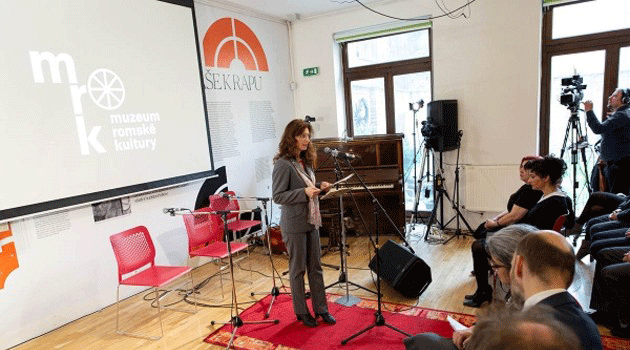Gwendolyn Albert: "I believe the illegally sterilized women will be compensated"
ROMEA TV’s “10 Minute Talk Show” program has interviewed Gwendolyn Albert, a human rights activist who has been fighting for illegally sterilized women in the Czech Republic to be compensated. She spoke with interviewer Jarmila Balážová about why she ended up settling in the Czech Republic in 1994, how she got involved in the subject of human rights, why she took an interest in the Czech state removing the pig farm from the site of the Protectorate-era concentration camp for Romani people at Lety, and why she has been advocating for compensation for the women who have been forcibly sterilized.
On 2 August 2020, Gwendolyn Albert received the award “For Humanity” from the Committee for the Redress of the Romani Holocaust, an organization that brings together the descendants of victims of the Lety camp, for her longtime activity defending human rights, especially with respect to the forced sterilization of Romani women, as part of this year’s commemorative ceremony there. “That was a really overwheming experience for me. The first time I had ever been to Lety was in 1995, when President Václav Havel first unveiled the memorial that is still there today. By then I knew that Romani people existed. In those days situations were transpiring in which human rights were being violated. Ultra-right violence against Romani people was happening here again. I began to take in interest in it because I had always been active in the human rights field,” she told ROMEA TV.
Removing the pig farm from the site of the former concentration camp at Lety u Písku was a demanding, protracted journey. Gwendolyn never gave up, never lost hope, and always believed the grounds of the former concentration camp would become a dignified place of remembrance someday.
“I always hoped it would turn out like this. I recall what it was like to realize we had been fighting to remove the pig farm for 10 years. At that time I couldn’t believe that we hadn’t achieved it yet. However, we have lived to see it happen, and it’s not just that the pigs are no longer there. The entire process of designing the new memorial, of depicting how things actually were there, all of the organization done by the Museum [of Romani Culture] and the plan for the new memorial was very inclusive, and as a start it’s genuinely very good,” she said.
Gwendolyn is of Czech descent on her mother’s side, but that was not the main reason she decided to visit the Czech Republic. The first time she came to what was then Czechoslovakia was in 1988, for a summer course in the Czech language, after which she returned on a Fulbright grant in the 1989-1990 academic year to study linguistics.
“I was very interested in life behind the Iron Curtain. I actually wanted to see it for myself. At the University of California, where I was studying, they offered Czech, which was rare, and I realized that. I wanted to take advantage of that rare opportunity, and it changed my entire life. I don’t regret it at all,” she said about her decision to come to Czechoslovakia as a student.
In 1990 she returned to California. Four years later, she returned to what had become the Czech Republic with her future husband and they decided to settle here.
“I was living in South Bohemia, which is how I got interested in Lety. When we were living in Tábor, I noticed that Romani people lived there, but that their social interaction with other people was practically zero. I noticed it immediately because people warned me not to go the part of town where the Roma lived, they warned me against interacting with them. It was an open aversion. Even though at that time the concept didn’t really exist in this context yet, I’d say that it was antigypsyist behavior,” she told ROMEA TV.
The subject of compensating women who have been forcibly sterilized is another big theme of her work as an activist. Right now she is waiting for the bill legislating that compensation process to undergo a first reading in the lower house.
“At this moment it’s all up to the lawmakers and how they will explain and interpret this law to their voters. This country knows how to compensate people for wrongdoing in the past, this is not a foreign concept. At this moment we are all very focused on the health care system and how it works. People could very well understand that if something goes wrong there, which in this case involves an egregioius violation of human rights, then there should be redress. In such a case it’s not enough to say ‘Yes, we know it was awful, too bad.’ That kind of response, when human rights are violated, is not possible, it’s not good enough. I believe people know this. At this moment we are closer to achieving our aim than we ever have been, the lower house is deciding now when the first reading of the bill will be,” she told ROMEA TV.
